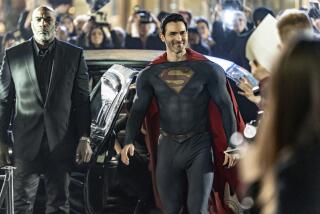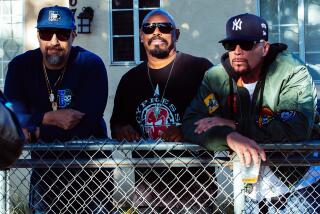‘Glorious’ Thoughts With KCET Fund-Raiser
- Share via
With four of its August pledge nights eclipsed by the political conventions, KCET-TV Channel 28 returns Sunday and Monday nights with some rather unusual fund-raising fare.
Instead of the traditional sort of upbeat, entertaining pledge programming designed to engage the viewer and enhance membership, KCET is presenting “A Glorious Accident,” which it describes as “part adventurous scientific exploration, part mind-opening philosophical sojourn.”
Made in Holland in 1993 by Dutch filmmaker Wim Kayzer, the eight-hour “Glorious Accident” features hourlong interviews by Kayzer with six leading scientists: neurologist and psychiatrist Oliver Sacks, cell biologist and biochemist Rupert Sheldrake, philosopher Daniel C. Dennett, philosopher of science Stephen Toulmin, physicist Freeman Dyson and paleontologist Stephen Jay Gould.
*
The first five interviews can be seen Sunday, with pledge breaks, from 8 p.m. to 2 a.m. Monday’s edition from 8-11:30 p.m. includes the Gould interview and two hours in which the six men come together and confront one another on their ideas about who we are, where we came from, why we’re here.
“This stuff is dense and deep and antithetical to what most people’s definition of what television is,” conceded Stephen Kulczycki, senior vice president of programming at KCET, “and that’s why we wanted to try it.”
Kulczycki first heard about the program after it aired on WNET in New York during that station’s June 1994 pledge drive and raised more than $215,000, which he called an “explosive pledge success.”
Two years later, however, when the program aired on KQED in San Francisco on a Saturday and Sunday morning, the show drew just $22,000.
Kulczycki said if “Glorious Accident” brings in 500 to 1,000 new members, he’ll consider it a success.
On the last two nights of KCET’s pledge drive, Sept. 21 and 22, the station returns to more usual fare: repeats of a “Les Miserables” concert, the animated version of William J. Bennett’s “Book of Virtues” and Hugh Hewitt’s “Searching for God in America.”
More to Read
The complete guide to home viewing
Get Screen Gab for everything about the TV shows and streaming movies everyone’s talking about.
You may occasionally receive promotional content from the Los Angeles Times.






